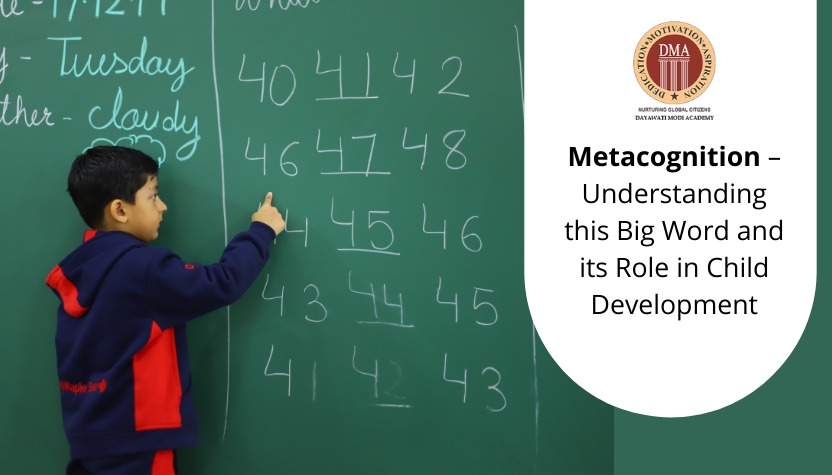If you are a parent, you might have often found yourself in a situation where your kid is struck at a math problem or a spelling or even a social situation that he/she can’t control and is ready to give up without thinking twice! What do you think is the right parenting approach in such situations? A). Not to get frustrated yourself, and B). Help your kid transition from the ‘I can’t do it’ to ‘How can I do it?’ attitude.
Now, this is easier said than done. To make this transition, the child has to ‘Think’ about WHY he/she is stuck at something, HOW can he/she not be stuck, and WHAT is the cause of the frustration. In essence, they need to ‘think’ about their ‘thoughts’!
So, is there a simpler way to put this across? Yes, there is a word, and it’s metacognition.
Years of research in this area have made it very clear that children taught about this art of thinking, called metacognition, are more self-aware as they grow up. They proactively work towards overcoming any hurdles in their path. Hence, metacognition is indeed a powerful tool to teach children resilience, compassion, curiosity, and much more.
So today, we, at Dayawati Modi Academy, ranked among the best cbse schools in meerut, have brought forth for you our insights into what exactly metacognitive skills are and how to help children get better at metacognition.
What is Metacognition?
Simply put, metacognition is the art of reflecting on your own thoughts. Think of it as the snippets of conversations you have with yourself all through the day that help you make plans, tell you how you feel about a certain situation, and pick you up when you are feeling low.
The more you know about what you are thinking, the more you create perspective and ultimately make room for self-improvement and change.
Now, look at it this way – When kids are taught in absolutes – like they are good at something and bad at something else, they grow with biases and usually cannot change the outcomes. However, if kids master meta-cognitive thinking, they become self-aware, know their potential, and always look at a problem from the perspective of solving the same instead of running away from the situation.
Now the question arises – how to develop the crucial metacognition skills in children? So here are the most effective ways that will fetch you some great results when it comes to building metacognition in your kids.
- Include self-assessment tasks – The whole point of metacognition is to be self-aware. And to that end, a simple yet powerful method would be to give kids tasks involving self-assessment. How much the child rates himself/herself in the different questions is really not that important. What’s important is that they take time out to think about themselves.
- Encourage kids to visualize – It is a common human tendency to fear the unknown. Once children can visualize their learning goals or problems, they feel motivated to achieve their goals proactively. You can use charts or even doodles to explain to them their daily learning goals.
- Use a gradual approach – At Dayawati Modi Academy, we firmly believe that metacognition should be taught to kids as a part of the natural learning process. However, children usually need some guidance in seeing how this form of thinking looks like. Hence, walk them through the process, first verbally and then by using a visual aid. The goal is to integrate lessons on metacognition as long-term strategies instead of isolated lessons.
Summing up
Like all other life skills, mastering metacognition takes time and patience. Hence, while you should reward your child appropriately on the learning path, there is nothing wrong in leaving some room for mistakes as well. After all, mistakes are a proof that they tried. As one of the best cbse schools in meerut, we, at Dayawati Modi Academy, use the above methods to encourage metacognitive thinking among our pupils as a part of our pedagogy. This helps ensure that children develop such skills from a young age and become well-rounded individuals when they grow up.

